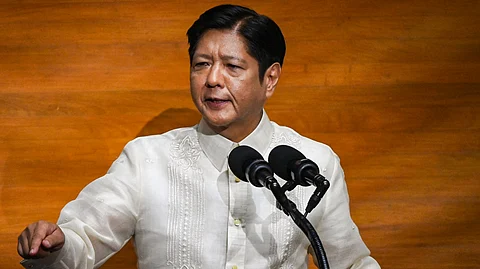
- NEWS
- the EDIT
- COMMENTARY
- BUSINESS
- LIFE
- SHOW
- ACTION
- GLOBAL GOALS
- SNAPS
- DYARYO TIRADA
- MORE

It is now 2025, exactly three years since he ascended the ladder of political power. Amid controversies, political war, power play struggle, and opposing opinions in the outside world, President Ferdinand “Bongbong” Marcos Jr. has remained consistent in his vision of a Bagong Pilipinas (New Philippines), which is to uplift Filipino lives, help the poor, advance the country’s infrastructure and maintain a strong position in the global stage as a friend to all and an enemy to none.
Despite having the Marcos family legacy resting on his shoulders, Bongbong wants to have a name for himself, a direct confrontation to criticisms on his upbringing and having a better legacy than his father.
To run his government better, he has enlisted names of the past, the present, and the future to manage key sectors of his government such as Agriculture, Transportation, Information and Communications Technology, Tourism, Finance, Economy and Education.
Marcos carefully assigned them to perform a mandate: make Filipino lives better. Their expertise was utilized, making informed decisions, backed by evidence and data. But, not all projects — however full of hope they may be, got to see the light of day due to bureaucracy.
Raising the marginalized
Marcos’ vision is in order to have a Bagong Pilipinas, the country’s citizens must have a Bagong Pilipino, capable of promoting the Philippines.
Going down to the locals, Marcos put his focus on the marginalized sector. Armed with financial aid and social programs, the President seeks to empower neglected industries, reviving the remnants of local communities once defined by the Marcos Sr. era such as strong agriculture and fisheries.
Keeping his campaign promise of a P20 per kilo rice, Marcos launched the Benteng Bigas Meron Na program to free Filipinos from expensive rice – a move considered by critics to be a last resort to put the election in the favor of the administration considering the timing of the implementation, which was in May.
Currently, indigents, senior citizens, solo parents, persons with disabilities, and minimum wage earners can avail of the cheap rice from KADIWA markets.
In the same breath, the government invites farmers to directly sell their Palay to the National Food Authority and skip the traders who buy them at low price.
Public service focus
Following the administration’s poor performance in the midterm elections, Marcos pointed out that the public is tired of politics and shifted his administration’s focus in bringing service to the people at blazing speeds.
This decision includes making the sacrifice of making painful, necessary changes in his cabinet by asking them to submit courtesy resignations.
Instead of booting them out, Marcos retained, re-assigned, and replaced his Cabinet.
One specific change in his cabinet, made earlier, sparked an idea to the President, and it is the appointment of Transportation Secretary Vince Dizon.
Dizon has proven to be an effective leader compared to his predecessor. Despite having to be exposed immediately to problems with stakeholders, the new transport chief faced them head on, and asked concerned sectors for help in solving their problems such as the jeepney modernization program, corruption in the main entry points of the nation, and public transportation.
Marcos wanted to have more people like Vince in his cabinet. It also renewed his commitment in being focused on governance and to be a leader.
Improving public safety became a concern for the President, who in 2024, banned the Philippine Offshore Gaming Operations in the country. POGO became a threat in the lives of Filipinos.
Recently, he issued a new directive for the Philippine National Police under the leadership of General Nicolas Torre III to have an increased visibility of police personnel in public areas, as well as have a response time of 5 minutes for reports coursed through the emergency hotline system 9-1-1.
Hardline stance in WPS
Departing from his predecessor’s foreign policy of bringing in his neighbors closer, even if it is committing harassment and bullying among smaller fishing boats and humanitarian missions, Marcos has maintained a strong position against grave action by China in the West Philippine Sea but has kept close economic ties with Beijing.
Even with multiple incidents with Philippine vessels, Marcos said the Philippines will remain undeterred in defending Philippine sovereignty stressing it will not surrender even an inch of territory.
At the same time, the independent foreign policy implemented by the Marcos administration is seen to be working well, enticing foreign investors to come to the Philippines and look at the government policies that benefit both the companies and consumers.
In terms of military commitments, recent meetings between Marcos and Defense Minister of Japan Nakatani Gen and the Defense Secretary of the United States Pete Hegseth have strengthened the military ties within the Indo-Pacific region.
The Philippines’ reliance in the United States military has expanded opportunities for Filipino troops to learn more about defending the country and engaging in different forms of warfare not just with arms, but with cybersecurity and artificial intelligence, creating a stronger defense of the Philippines.
The modernization of the Armed Forces of the Philippines serves as one of the priorities of the Marcos administration.
While still embroiled in a political squabble such as Cabinet members wanting to keep their seats, politicians deciding who will succeed him as Chief Executive, attempting to fix a broken relationship with the Vice President, seeking justice for drug war victims, clearing his family’s name being hunted by a dark past, Marcos has his plates full but nevertheless, his love of country and Filipinos remain steadfast which fuels his energy in serving the public, and making himself visible, approachable, being hard at work.
